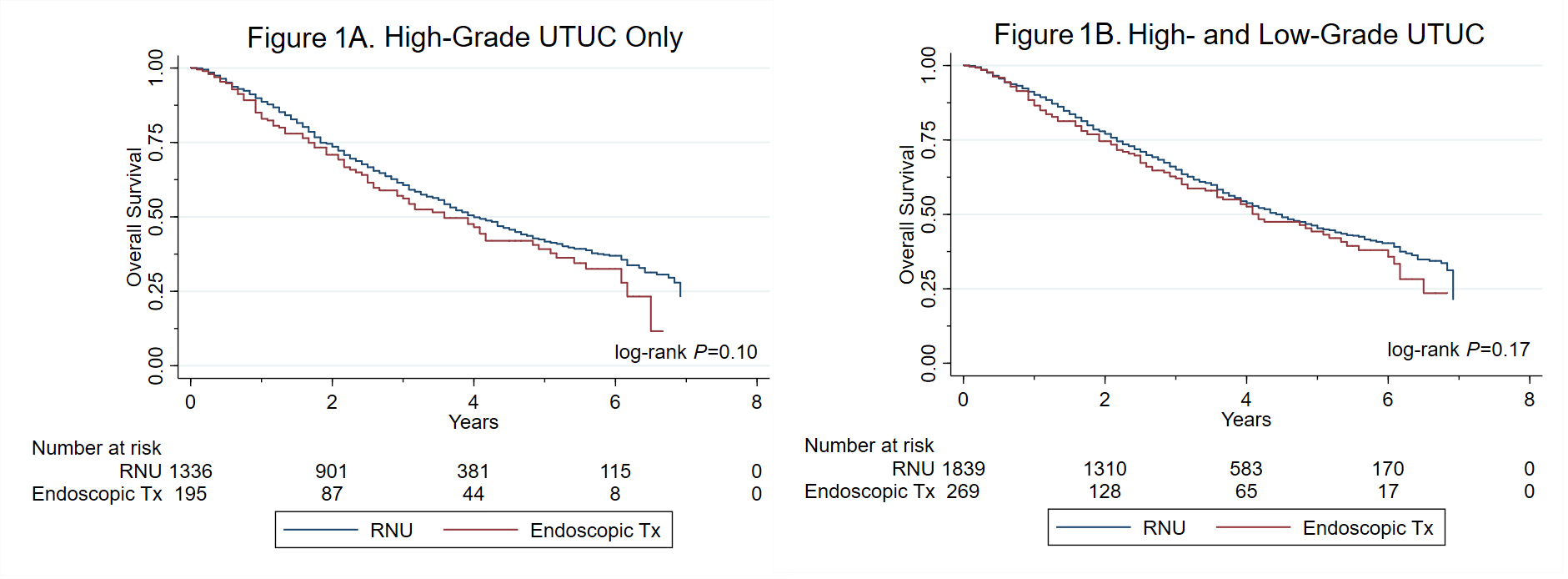Back
Poster, Podium & Video Sessions
Podium
PD58: Bladder Cancer: Upper Tract Transitional Cell Carcinoma II
PD58-08: Survival Outcomes in Solitary Kidney Patients Diagnosed with Upper Tract Urothelial Carcinoma
Monday, May 16, 2022
2:10 PM – 2:20 PM
Location: Room 252
Ridwan Alam*, Joseph Cheaib, Michael Biles, Baltimore, MD, Jared Winoker, New York City, NY, Nirmish Singla, Baltimore, MD, Trinity Bivalacqua, Phillip Pierorazio, Philadelphia, PA, Max Kates, Sunil Patel, Baltimore, MD

Ridwan I. Alam, MD,MPH
Johns Hopkins University School of Medicine
Podium Presenter(s)
Introduction: Solitary kidney patients who develop upper tract urothelial carcinoma (UTUC) present a significant management challenge. Radical nephroureterectomy (RNU) renders these patients anephric with a need for dialysis, which is associated with lower life expectancy and decreased quality of life. However, organ-sparing endoscopic treatment may result in undertreatment of the cancer process. We sought to compare survival outcomes between RNU and endoscopy in solitary kidney patients diagnosed with clinically localized UTUC.
Methods: The Surveillance, Epidemiology, and End Results database was linked to Medicare records to identify patients diagnosed with UTUC through 2017. This data was then linked to the Medicare Provider Analysis and Review and National Claims History databases to identify patients with a solitary kidney. Only patients with an established diagnosis of solitary kidney prior to developing clinically node-negative and non-metastatic disease (cN0M0) UTUC were included. Patients were stratified by treatment with RNU versus endoscopy. Kaplan-Meier analysis was performed to estimate survival between the two groups.
Results: A total of 2108 solitary kidney patients with cN0M0 UTUC were identified, with a median age of 75.3 years at diagnosis [IQR 69.3-81.1]. Median follow-up time was 2.8 years [IQR 1.7-4.4]. High-grade disease was present in 1531 patients (72.6%), of whom 1344 underwent RNU and 195 underwent endoscopy. Between the two treatments, there was no difference in either cancer-specific survival (P=0.18) or overall survival (P=0.10) [Figure 1A]. When combining high- and low-grade UTUC patients, 1839 underwent RNU and 269 underwent endoscopy. Again, no difference was observed in cancer-specific survival (P=0.31) or overall survival (P=0.17) [Figure 1B]. Patients with high-grade disease demonstrated higher rates of cancer-specific and overall mortality than those with low-grade disease (both P<0.001).
Conclusions: Solitary kidney patients diagnosed with clinically localized UTUC demonstrate no difference in survival outcomes when comparing RNU to endoscopic treatment. This potentially suggests that, when weighed against the option of endoscopic treatment, the benefits of RNU in these patients may not outweigh the risks of becoming anephric and therefore dependent on dialysis.
Source of Funding: None.

Methods: The Surveillance, Epidemiology, and End Results database was linked to Medicare records to identify patients diagnosed with UTUC through 2017. This data was then linked to the Medicare Provider Analysis and Review and National Claims History databases to identify patients with a solitary kidney. Only patients with an established diagnosis of solitary kidney prior to developing clinically node-negative and non-metastatic disease (cN0M0) UTUC were included. Patients were stratified by treatment with RNU versus endoscopy. Kaplan-Meier analysis was performed to estimate survival between the two groups.
Results: A total of 2108 solitary kidney patients with cN0M0 UTUC were identified, with a median age of 75.3 years at diagnosis [IQR 69.3-81.1]. Median follow-up time was 2.8 years [IQR 1.7-4.4]. High-grade disease was present in 1531 patients (72.6%), of whom 1344 underwent RNU and 195 underwent endoscopy. Between the two treatments, there was no difference in either cancer-specific survival (P=0.18) or overall survival (P=0.10) [Figure 1A]. When combining high- and low-grade UTUC patients, 1839 underwent RNU and 269 underwent endoscopy. Again, no difference was observed in cancer-specific survival (P=0.31) or overall survival (P=0.17) [Figure 1B]. Patients with high-grade disease demonstrated higher rates of cancer-specific and overall mortality than those with low-grade disease (both P<0.001).
Conclusions: Solitary kidney patients diagnosed with clinically localized UTUC demonstrate no difference in survival outcomes when comparing RNU to endoscopic treatment. This potentially suggests that, when weighed against the option of endoscopic treatment, the benefits of RNU in these patients may not outweigh the risks of becoming anephric and therefore dependent on dialysis.
Source of Funding: None.


.jpg)
.jpg)